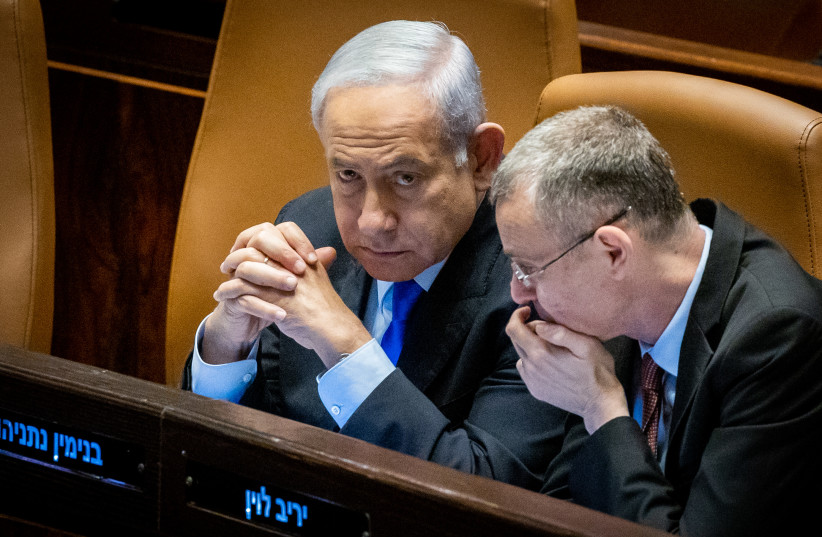A short memory can be both a blessing and a curse.
It’s a blessing, because it helps people move on from past failures and disappointments without dwelling on them. It also facilitates forgiveness and reconciliation. If you don’t remember your grievances, you won’t be burdened by grudges that can arise from those grievances.
However, a short memory can also be a curse, because if you forget the lessons learned from past mistakes, you’re likely to repeat them.
In the current debate on judicial overhaul, a short memory will be more of a curse than a blessing, as the coalition prepares for a crucial vote on Wednesday. It will have to decide whether the powerful Judicial Selection Committee, responsible for appointing judges to the Supreme Court and other civilian courts, will include both a coalition and an opposition MK as it traditionally has, or consist solely of two coalition MKs.
It is essential for everyone, particularly Prime Minister Benjamin Netanyahu, to remember the self-destructive loop the country was entangled in just under three months ago.

On Saturday night, March 25, Defense Minister Yoav Gallant, faced with the gravity of the threats posed by reserve pilots refusing to show up for service in protest against the proposed judicial reform, and having received intelligence on how external adversaries were interpreting Israel’s internal conflicts, delivered a dramatic address to the country.
He emphasized the urgent need to halt the judicial reform process and initiate a dialogue, framing it as a national security imperative.
“As Israel’s defense minister, I say clearly that the breach within the nation has penetrated deep into the IDF and the defense establishment. This is a clear, real, and immediate danger to the security of the state,” he said.
Netanyahu was in London at the time. He did not like what he heard and announced his intention to fire Gallant. Much of the country did not like what they herd from Netanyahu, and tens of thousands of people spontaneously took to the streets in protest. The following day, Histadrut head Arnon Bar-David, who had previously stayed out of the conflict, called for a general strike, and shortly after, Ben-Gurion Airport was temporarily closed.
Realizing that matters had escalated too far and the situation was spiraling out of control, Netanyahu wisely halted the judicial reform. He agreed to enter negotiations with the opposition on the proposed reform, under the auspices of President Isaac Herzog. Netanyahu never formally fired Gallant, and the defense minister retained his position.
A week after these developments, and not unconnected, rockets were fired on Israel from Lebanon, from Syria and from Gaza. During the same period, terrorists in the West Bank murdered Lucy Dee and her daughters Maia and Rina and there were terrorist attacks in Tel Aviv and Jerusalem. The security situation in the country appeared particularly ominous, and as Gallant had warned, it was linked to the perception by Israel’s enemies of a society crumbling from within.
That was the reality then, some two and a half months ago. But in Israel, two-and-a-half months is a long time. A lot has happened since then, including the passage of the budget and a mini-war in Gaza.
Things calmed down a bit after Netanyahu hit the pause button on the judicial reform. Pilots and other reservists stopped threatening not to show up for reserve duty, the flow of hi-tech money out of the country slowed, and Israel did not lose its positive credit ratings.
Negotiations over the reform continued under the president’s auspices, something the polls showed that most of the country favored. National Unity Party head Benny Gantz soared in the polls, because he was perceived as a backer of compromise and dialogue. The protests continued, but not with the same intensity nor with the same numbers.
The problem when things calm down, however, is that people tend to forget – the short memory kicks in. And in this case, that is a shame.
As the Knesset prepares to vote on its two representatives to the Judicial Selection Committee, it should remember the feeling of chaos and the detrimental cycle the country was caught in just over two months ago. That situation was defused by a willingness to talk and seek a compromise.
Talks will end if two coalition members selected for committee
If, as some within the coalition are pressing, Netanyahu decides to ensure that two coalition MKs are selected to the committee, then – as Gantz and Yesh Atid’s Yair Lapid have made clear – that will be an end to the talks.
And an end to the talks means the likelihood of the coalition unilaterally pushing through parts of the judicial reform program, which will lead – again – to the scenes that marred the country just a few short months ago: “days of disruption,” strikes, reservists threatening not to turn up for duty, and more massive demonstrations than those that are now a weekly occurrence.
In short, the country will be hurtled backward a couple of months – not a good or comfortable place to be. After weeks of talks, the sides reportedly are on the cusp of an agreement on a couple of relatively minor issues in the reform. The agreement would curtail the Supreme Court’s ability to cite the “reasonableness factor” in assessing government decisions, and would limit the authority of government ministry legal advisers, in exchange for shelving the rest of the judicial overhaul for a year or longer.
That compromise, which would leave many people on both sides unhappy, would at least prevent a leap backward to the recent past. Not appointing an opposition MK to the Judicial Selection Committee would blow that all up.
Is it worth it?
